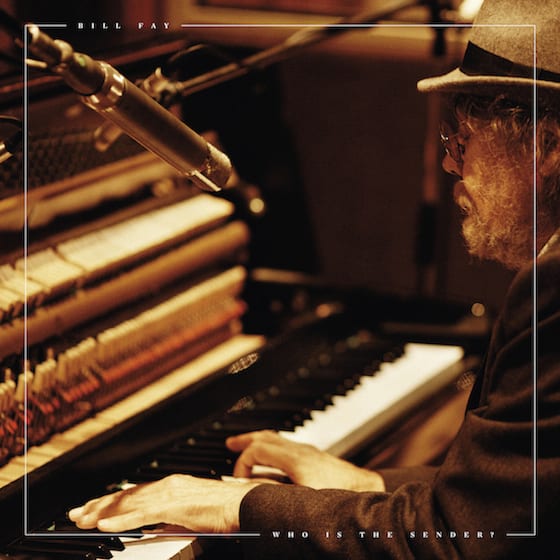Back in the songwriter days of the early '70s, Bill Fay recorded two very different sounding "folk" albums, both of which wound up as commercial duds, before disappearing from the music scene and from public view altogether. It seemed as though the world would never hear from Fay ever again — that is until the late '90s, when a renewed interest in his music came in the form of reissues and pleas for a return. In 2012, he did just that, reintroducing his name to the world and to a new generation, while also assuming his place as a cult hero and inspiration for countless contemporary songsmiths — among them Jim O'Rourke, Nick Cave and Jeff Tweedy.
But if Fay's 2012 return album, Life Is People, acted as his grandiose return to a stage he never quite got to experience, one that saw his protégés getting their chance to live out their dreams on collaborative tracks alongside their hero, then Who Is The Sender? is the album Fay might have made for himself if we continued to leave him alone. It's a thought he ponders on the album opener "The Geese Are Flying Westward," as he sings, "Maybe I should have ventured / Outside the places that I know / But I don't think so / I'm so glad to stay home." It's as though, now that Fay knows we're listening and he's said thanks to those responsible for that, he can get back to writing about the stuff that really matters to him.
Gone here is the sense of glee that permeated many of the tracks on Life Is People, and in its place is a less ecstatic but equally present version of Fay who sings with a soft, atmospheric vocal delivery that recalls that of Robert Wyatt. The only notable guest this time around is J. Spaceman, and his presence is minimal. The songs sound like a man and his piano, and the best moments are often the starkest. That's not to belittle the music on Life Is People — they're simply different sides to Fay's far-reaching songcraft — but for fans of Fay's '70s material, there's more to be found here.
Who Is The Sender? is a quiet and contemplative album, one that offers patient and careful observation of the world we live in — a world that Fay seems genuinely concerned for. As he sings on "Underneath The Sun": "And trains of uranium roll through the night to their destination / Underneath the sun / Why on earth is this happening? / What have we done?" In other words, he's singing about a world that he sounds more than happy to have observed at arm's length.
(Dead Oceans)But if Fay's 2012 return album, Life Is People, acted as his grandiose return to a stage he never quite got to experience, one that saw his protégés getting their chance to live out their dreams on collaborative tracks alongside their hero, then Who Is The Sender? is the album Fay might have made for himself if we continued to leave him alone. It's a thought he ponders on the album opener "The Geese Are Flying Westward," as he sings, "Maybe I should have ventured / Outside the places that I know / But I don't think so / I'm so glad to stay home." It's as though, now that Fay knows we're listening and he's said thanks to those responsible for that, he can get back to writing about the stuff that really matters to him.
Gone here is the sense of glee that permeated many of the tracks on Life Is People, and in its place is a less ecstatic but equally present version of Fay who sings with a soft, atmospheric vocal delivery that recalls that of Robert Wyatt. The only notable guest this time around is J. Spaceman, and his presence is minimal. The songs sound like a man and his piano, and the best moments are often the starkest. That's not to belittle the music on Life Is People — they're simply different sides to Fay's far-reaching songcraft — but for fans of Fay's '70s material, there's more to be found here.
Who Is The Sender? is a quiet and contemplative album, one that offers patient and careful observation of the world we live in — a world that Fay seems genuinely concerned for. As he sings on "Underneath The Sun": "And trains of uranium roll through the night to their destination / Underneath the sun / Why on earth is this happening? / What have we done?" In other words, he's singing about a world that he sounds more than happy to have observed at arm's length.
